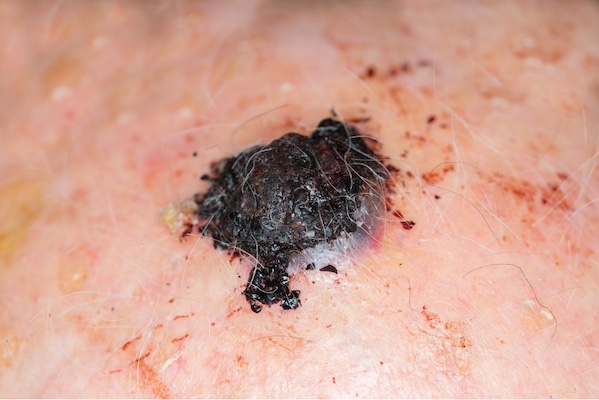Moderna and Merck’s Novel Cancer Vaccine, Keytruda Combo Cuts Risk of Skin Cancer Death, Recurrence by Half
December 27, 2023
Source: drugdu
 607
607
Pharmaceutical Executive Editorial Staff
Adjuvant treatment with Moderna’s mRNA-4157 (V940) in combination with Merck's Keytruda lowered the risk of recurrence or death by 49% compared with Keytruda monotherapy.
 Findings from the KEYNOTE-942/mRNA-4157-P201 clinical trial show that Moderna’s investigational individualized neoantigen therapy plus Merck’s Keytruda (pembrolizumab) lowered the risk of death or relapse by nearly half in patients with resected high-risk melanoma (stage III/IV) following complete resection.
Findings from the KEYNOTE-942/mRNA-4157-P201 clinical trial show that Moderna’s investigational individualized neoantigen therapy plus Merck’s Keytruda (pembrolizumab) lowered the risk of death or relapse by nearly half in patients with resected high-risk melanoma (stage III/IV) following complete resection.
A planned analysis of the Phase IIb randomized trial found that at a median follow-up of approximately three years, adjuvant treatment with Moderna’s mRNA-4157 (V940) in combination with Keytruda continued to show a clinically meaningful improvement in recurrence-free survival (RFS) by lowering the risk of recurrence or death by 49% compared with Keytruda monotherapy.
“As we continue to follow participants in the KEYNOTE-942/mRNA-4157-P201 study, we are excited to see such a robust clinical benefit with mRNA-4157 (V940) as adjuvant treatment in combination with Keytruda in people with resected high-risk melanoma,” Kyle Holen, MD, Moderna senior vice president and head of Development, Therapeutics and Oncology, said in a press release. “These data add another positive analysis to the multiple endpoints and subgroups previously assessed in this study. Importantly for this technology, the KEYNOTE-942/mRNA-4157-P201 study was the first demonstration of efficacy for an investigational mRNA cancer treatment in a randomized clinical trial and the first combination therapy to show a significant benefit over Keytruda alone in adjuvant melanoma. We look forward to sharing these data with people impacted by this disease and the broader scientific community.”
Further, the treatment combination also showed a meaningful improvement in distant metastasis-free survival (DMFS) vs. Keytruda monotherapy, lowering the risk of developing distant metastasis or death by 62%.
V940 is comprised of synthetic mRNA coding for up to 34 neoantigens that are designed and produced based on the unique mutational signature of a patient’s tumor. After administration of the drug, the algorithmically derived and RNA-encoded neoantigen sequences are endogenously translated and undergo natural cellular antigen processing and presentation.
Keytruda is an anti-programed death receptor-1 (PD-1) therapy that improves the immune system's ability to detect and fight tumor cells. The humanized monoclonal antibody blocks the interaction between PD-1 and its ligands, PD-L1 and PD-L2, which leads to the activation of T lymphocytes that could affect tumor and healthy cells.
In terms of safety, adverse events (AEs) in KEYNOTE-942 reported were consistent with prior findings. At approximately three years, rates of treatment-related grade ≥3 AEs were similar between the treatment cohorts at 25% for mRNA-4157 (V940) in combination with Keytruda vs. 20% for Keytruda monotherapy. The most common AEs of any grade attributed to mRNA-4157 (V940) were fatigue (60.6%), injection site pain (56.7%), and chills (49%).
“We are committed to driving research forward for innovative modalities in earlier stages of cancer, where we can make the most meaningful impact for patients, by combining Merck’s expertise in immuno-oncology with Moderna’s innovative mRNA technology,” said Marjorie Green, MD, senior vice president and head of late-stage oncology, global clinical development, Merck Research Laboratories. “We are pleased to see the results from these planned analyses on recurrence-free survival for V940 (mRNA-4157), and look forward to working with Moderna in expanding our clinical development program for the individualized neoantigen therapy.”
Based on data from the Phase IIb KEYNOTE-942/mRNA-4157-P201 trial, the FDA awarded Breakthrough Therapy Designation to mRNA-4157 (V940) plus Keytruda for the adjuvant treatment of patients with high-risk melanoma.
Earlier this year, Moderna and Merck initiated a Phase III trial of the combination for non-small cell lung cancer that is currently enrolling globally (INTerpath-002, NCT06077760) with plans to expand the developmental program to additional tumor types.
By editorRead more on
- Gusekirumab Injection Accepted by CDE, Multiple Pipelines Advancing Simultaneously March 4, 2026
- Yifan Pharmaceutical’s teriparatide injection has been accepted by the CDE (Center for Drug Evaluation), adding a new domestic player to the osteoporosis treatment field March 4, 2026
- //news.yaozh.com/archive/47318.html PD-1 sales surge March 4, 2026
- A major breakthrough! Roche’s oral BTK inhibitor achieves its third Phase III clinical trial victory, a game-changer in the multi-billion dollar MS (manufactured pharmaceuticals) market. March 4, 2026
- GB19 Injection Approved for Clinical Trials of Cutaneous Lupus Erythematosus March 4, 2026
your submission has already been received.
OK
Subscribe
Please enter a valid Email address!
Submit
The most relevant industry news & insight will be sent to you every two weeks.



